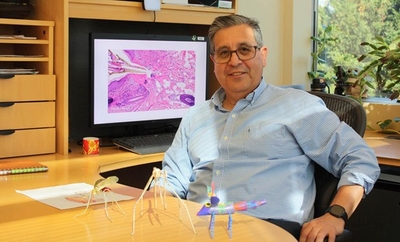
Research Topics
The Vector Molecular Biology Section investigates immune responses to ticks and insect bites, focusing on acquired cellular immunity against vector arthropods. Our research examines how these immune responses help humans detect and remove ticks before they transmit pathogens. Additionally, we study how adaptive immune responses impact pathogen transmission by insects, with the goal of developing interventions to prevent insect-borne diseases and parasitic infections.
Our primary focus is on ticks, sand flies, and mosquitoes, with ticks posing a significant public health threat in the U.S. and globally. Ticks transmit various diseases to humans, pets, and livestock, including Lyme disease, Rocky Mountain spotted fever, anaplasmosis, and the Powassan virus. In the U.S., ticks surpass mosquitoes as the leading disease vector for humans and animals. Beyond infectious diseases, ticks can also trigger conditions such as red meat allergy and tick paralysis.
The section employs a multidisciplinary approach, combining immunology, biochemistry, RNA sequencing, bioinformatics, functional genomics, fieldwork, and clinical studies. One key area of research focuses on the initial immunological events in the skin after a tick or insect bite, using this knowledge to prevent pathogen transmission. Another area explores how arthropod vectors become infectious, leading to groundbreaking discoveries, such as a new developmental stage of Leishmania in the sand fly gut and the role of natural antibody IgM in parasite genetic exchange.
A critical area of ongoing research is the development of diagnostic tools to assess prior exposure to tick and insect bites in humans. These tools use salivary proteins or recombinant proteins from ticks and insects to detect antibodies in exposed individuals. Such diagnostic innovations guide vector control strategies and preventive measures. Together, these advancements aim to identify at-risk individuals and protect them from tick-borne illnesses.
Biography
Dr. Valenzuela received his Ph.D. in biochemistry from the University of Arizona in 1995. He joined the Laboratory of Parasitic Diseases in 1996, became a research fellow in 1999, and became a tenure-track investigator in the Laboratory of Malaria and Vector Research in October 2002. Dr. Valenzuela became a Senior Investigator in October 2009. In 2019, Dr. Valenzuela became deputy chief of the Laboratory of Malaria and Vector Research.
Selected Publications
- Serafim TD, Iniguez E, Barletta ABF, Cecilio P, Doehl JSP, Short M, Lack J, Nair V, Disotuar M, Wilson T, Coutinho-Abreu IV, Meneses C, Andersen J, Alves E Silva TL, Oliveira F, Vega-Rodriguez J, Barillas-Mury C, Ribeiro JMC, Beverley SM, Kamhawi S, Valenzuela JG. Leishmania genetic exchange is mediated by IgM natural antibodies. Nature. 2023;623(7985):149-156.
- Serafim TD, Coutinho-Abreu IV, Oliveira F, Meneses C, Kamhawi S, Valenzuela JG. Sequential blood meals promote Leishmania replication and reverse metacyclogenesis augmenting vector infectivity. Nat Microbiol. 2018;3(5):548-555.
- Dey R, Joshi AB, Oliveira F, Pereira L, Guimarães-Costa AB, Serafim TD, de Castro W, Coutinho-Abreu IV, Bhattacharya P, Townsend S, Aslan H, Perkins A, Karmakar S, Ismail N, Karetnick M, Meneses C, Duncan R, Nakhasi HL, Valenzuela JG, Kamhawi S. Gut Microbes Egested during Bites of Infected Sand Flies Augment Severity of Leishmaniasis via Inflammasome-Derived IL-1β. Cell Host Microbe. 2018;23(1):134-143.e6.
- Oliveira F, Rowton E, Aslan H, Gomes R, Castrovinci PA, Alvarenga PH, Abdeladhim M, Teixeira C, Meneses C, Kleeman LT, Guimarães-Costa AB, Rowland TE, Gilmore D, Doumbia S, Reed SG, Lawyer PG, Andersen JF, Kamhawi S, Valenzuela JG. A sand fly salivary protein vaccine shows efficacy against vector-transmitted cutaneous leishmaniasis in nonhuman primates. Sci Transl Med. 2015;7(290):290ra90.
- Zhang WW, Karmakar S, Gannavaram S, Dey R, Lypaczewski P, Ismail N, Siddiqui A, Simonyan V, Oliveira F, Coutinho-Abreu IV, DeSouza-Vieira T, Meneses C, Oristian J, Serafim TD, Musa A, Nakamura R, Saljoughian N, Volpedo G, Satoskar M, Satoskar S, Dagur PK, McCoy JP, Kamhawi S, Valenzuela JG, Hamano S, Satoskar AR, Matlashewski G, Nakhasi HL. A second generation leishmanization vaccine with a markerless attenuated Leishmania major strain using CRISPR gene editing. Nat Commun. 2020;11(1):3461.
Related Scientific Focus Areas

Microbiology and Infectious Diseases
View additional Principal Investigators in Microbiology and Infectious Diseases

Molecular Biology and Biochemistry
View additional Principal Investigators in Molecular Biology and Biochemistry



This page was last updated on Tuesday, August 12, 2025